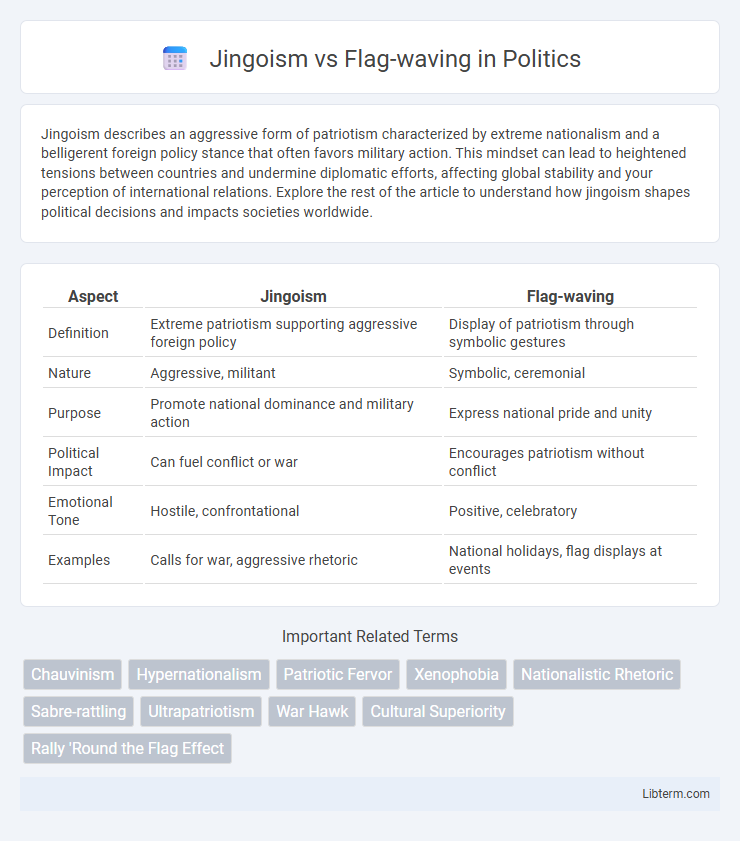Jingoism describes an aggressive form of patriotism characterized by extreme nationalism and a belligerent foreign policy stance that often favors military action. This mindset can lead to heightened tensions between countries and undermine diplomatic efforts, affecting global stability and your perception of international relations. Explore the rest of the article to understand how jingoism shapes political decisions and impacts societies worldwide.
Table of Comparison
| Aspect | Jingoism | Flag-waving |
|---|---|---|
| Definition | Extreme patriotism supporting aggressive foreign policy | Display of patriotism through symbolic gestures |
| Nature | Aggressive, militant | Symbolic, ceremonial |
| Purpose | Promote national dominance and military action | Express national pride and unity |
| Political Impact | Can fuel conflict or war | Encourages patriotism without conflict |
| Emotional Tone | Hostile, confrontational | Positive, celebratory |
| Examples | Calls for war, aggressive rhetoric | National holidays, flag displays at events |
Introduction to Jingoism and Flag-Waving
Jingoism represents an extreme form of aggressive patriotism characterized by hawkish foreign policies and a fervent belief in national superiority, often used to justify military intervention. Flag-waving involves the display or use of a national flag to evoke feelings of pride and unity but can sometimes mask deeper political motives or suppress dissent. Understanding the nuances between jingoism and flag-waving clarifies their distinct roles in shaping national identity and public opinion.
Defining Jingoism: Roots and Characteristics
Jingoism originates from late 19th-century British political slang, characterized by aggressive nationalism and a belligerent foreign policy stance advocating military action. This ideology emphasizes an uncompromising patriotism that often promotes warlike rhetoric without critical evaluation of consequences. Unlike general flag-waving, which involves displaying national pride through symbols, jingoism specifically entails a fervent and militant advocacy for national dominance and conflict.
What is Flag-Waving? Meaning and Manifestations
Flag-waving refers to the act of displaying or prominently showcasing a national flag to evoke patriotic feelings and symbolize national pride, often during public events, political rallies, or sports competitions. It manifests as visible demonstrations of allegiance through flag-bearing, chanting slogans, or wearing flag-themed clothing to reinforce unity and solidarity within a group. Unlike jingoism, which promotes aggressive nationalism and hostility towards other nations, flag-waving primarily serves as a unifying expression of cultural identity and pride.
Historical Origins of Jingoism
Jingoism originated in late 19th-century Britain during the Russo-Turkish War, coined to describe aggressive nationalism promoting military action to defend the empire. It reflects fervent patriotism mixed with belligerent foreign policy demands, emerging from public opinion shaped by media and political rhetoric. Distinct from mere flag-waving, which often signifies general patriotic display, jingoism implies an assertive, often militaristic stance rooted in historical geopolitical conflicts.
Flag-Waving in National Identity
Flag-waving serves as a powerful symbol of national identity, uniting citizens through visible displays of patriotism during public events and celebrations. It reinforces collective belonging and pride by embodying shared history, values, and cultural heritage. Unlike jingoism, flag-waving emphasizes inclusive national unity rather than aggressive nationalism or xenophobic attitudes.
Jingoism vs Flag-Waving: Key Differences
Jingoism involves aggressive nationalism characterized by an eagerness for war and overt hostility toward other countries, whereas flag-waving typically denotes patriotic pride expressed through displays of national symbols without necessarily endorsing conflict. Jingoism often promotes militaristic policies and confrontational rhetoric, while flag-waving serves as a unifying gesture of loyalty that can be both positive and non-aggressive. Understanding the key difference lies in jingoism's association with belligerence, contrasting with flag-waving's focus on symbolic patriotism.
Societal Impacts of Jingoistic Behavior
Jingoism often leads to heightened nationalistic fervor that can escalate tensions and foster division within multicultural societies. This aggressive patriotism risks marginalizing minority groups and diminishing democratic discourse by promoting intolerance and xenophobia. In contrast to mere flag-waving, jingoistic behavior fuels conflict and impedes social cohesion through its uncompromising and hostile stance.
The Role of Media in Promoting Both Phenomena
Media outlets often amplify jingoism by framing international issues with aggressive patriotism and promoting a narrative of national superiority, which can escalate public support for conflict. Conversely, flag-waving is commonly showcased through symbolic displays during sporting events and national holidays, fostering a sense of community and pride without necessarily inciting hostility. The selective portrayal and repetition of these images and messages by media shape public perception, fueling both fervent nationalism and celebratory patriotism.
Examples from History and Current Events
Jingoism, exemplified by aggressive nationalism during the 19th-century British Empire's expansion and the fervent pro-war rhetoric leading to World War I, emphasizes belligerent foreign policy and military intervention. Flag-waving often appears in patriotism displays, such as American public events during the Fourth of July or national sports games, symbolizing unity without endorsing conflict. Recent examples include the contrasting use of flag-waving during peaceful protests versus jingoistic rhetoric fueling polarized debates over foreign policy in global hotspots like Ukraine and Taiwan.
Conclusion: Navigating Patriotism and Extremism
Jingoism often escalates into aggressive nationalism, prioritizing blind loyalty and intolerance, while flag-waving typically symbolizes moderate patriotism and collective identity. Distinguishing these concepts is crucial for fostering healthy national pride without descending into extremist behavior or xenophobia. Cultivating informed patriotism encourages unity and respect, avoiding the divisive consequences associated with jingoistic zeal.
Jingoism Infographic

 libterm.com
libterm.com